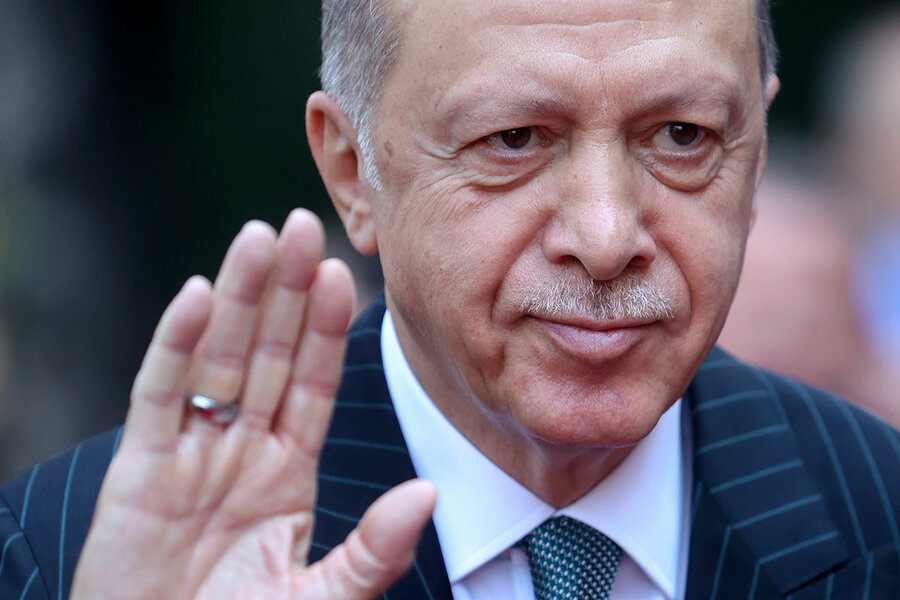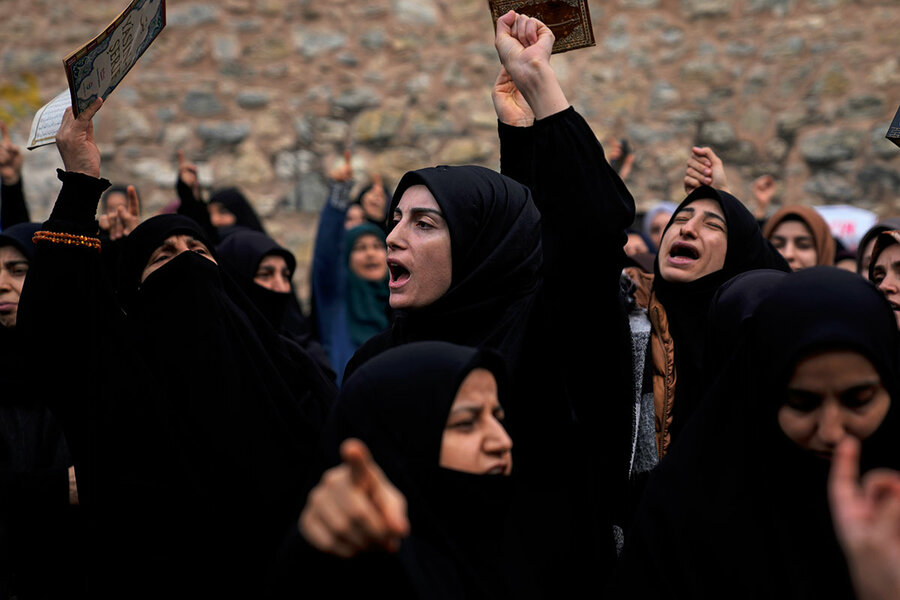Turkey in NATO: Inscrutable, unreliable, but indispensable
Loading...
| London
As the war in Ukraine enters a potentially decisive stage, one man is posing a thorny challenge for Washington and NATO, and for once it’s not Vladimir Putin. Turkish President Recep Tayyip Erdoğan is making his NATO partners wonder how to manage relations with an ally that is inscrutable and unreliable, yet also indispensable.
President Erdoğan has long taken an a la carte attitude to the Western alliance, in which Turkey is the second-largest military force after the United States. In 2017, for example, Ankara bought a Russian air defense system.
Why We Wrote This
A story focused onAuthoritarian Turkish President Recep Tayyip Erdoğan defies his NATO partners, buying Russian weapons and blocking European nations from joining the alliance. How to manage ties with a leader NATO cannot do without?
Now he is blocking Sweden’s application to join NATO, which needs unanimous approval. And there are signs Mr. Erdoğan is readying a strike against Kurdish forces in northern Syria, whom he regards as terrorists, but who were critically important U.S. allies in the battle to defeat Islamic State.
The Turkish leader’s political stock in allied capitals has never been lower. Some question whether Turkey should be in NATO at all.
But the United States and its allies recognize that an outright split within NATO would be a boon for Russian President Putin.
They appear to have concluded, as the old saying goes, that while it often seems that they can’t live with Mr. Erdoğan, they can’t live without him, either.
Two strongman leaders could go a long way to determining how the Ukraine war ends. Both are intolerant of dissent, both harbor 21st-century ambitions fueled by nostalgia for vanished empires, and both are scornful of what they see as America’s outsize influence on the world stage.
Yet while one, Russia’s Vladimir Putin, is a sworn enemy of the U.S.-led NATO alliance, the other is a key NATO member, Turkey’s Recep Tayyip Erdoğan.
And as the war in Ukraine enters a potentially decisive stage, he is presenting a thorny challenge for Washington and NATO: how to manage relations with an ally who is inscrutable and unreliable ... yet also indispensable.
Why We Wrote This
A story focused onAuthoritarian Turkish President Recep Tayyip Erdoğan defies his NATO partners, buying Russian weapons and blocking European nations from joining the alliance. How to manage ties with a leader NATO cannot do without?
The immediate concern is to keep Mr. Erdoğan from undermining NATO’s unified response to Russia’s invasion of Ukraine, bolstered by Finland’s and Sweden’s decisions to abandon their long-held neutrality and join the alliance.
President Erdoğan is blocking Sweden’s application, which requires unanimous approval.
But Turkey’s importance within NATO goes deeper. With the alliance’s second-largest military force after the United States, it straddles Europe and Asia, across the Black Sea from Ukraine and Russia.
Even before Russia’s invasion, Mr. Erdoğan had adopted an a la carte approach to NATO – most dramatically in 2017, when he shrugged off allied pleas and turned to Moscow to acquire a Russian missile defense system. That prompted Washington to cancel the sale to Turkey of America’s newest fighter jet, the F-35.
Since the war began, Mr. Erdoğan has carved out a role distinct from his NATO partners, keeping lines open to both Moscow and Kyiv.
He did oppose the invasion. Turkish drones helped Ukraine repel Russian forces, and under the terms of a 1930s international convention, Turkey has barred naval vessels from entering the Black Sea – in effect preventing Mr. Putin from reinforcing his fleet.
The Turkish president also mediated a deal with Mr. Putin to allow the export of Ukrainian grain.
But he has opted out of moves to isolate Moscow over the invasion. Turkey has increased its trade with Russia, and welcomed more than 5 million Russian visitors.
Beyond Ukraine, there’s a further source of friction, over Syria. Officials in Washington are concerned that Mr. Erdoğan might launch a new military push into northern Syria against Kurdish forces there. Ankara regards them as terrorists, although the Kurds were critically important U.S. allies in the battle to defeat Islamic State.
And although Washington and other NATO capitals hope they might find a way of resolving these tensions, they could, in fact, intensify in the coming months.
That’s because of domestic Turkish politics.
In May, Mr. Erdoğan faces elections, which are shaping up – amid economic turmoil – to be the most serious political challenge of his two-decade rule. Unsettled by polls suggesting he might lose, he has begun a huge campaign of handouts, including tax concessions, loans, and subsidies for energy and other household expenses.
If those are the carrots, Mr. Erdoğan also has an arsenal of sticks. He has accumulated wide-ranging power, enjoying effective control over most of the media and the judicial system, and has cracked down on opponents, especially since a failed military coup in 2016.
The figure seen as best placed to defeat him, Istanbul Mayor Ekrem İmamoğlu, was handed a jail sentence six weeks ago for criticizing election authorities over their ultimately failed attempt to question his 2019 mayoral victory. If confirmed by an appeals court, the ruling would bar him from running.
Still, Mr. Erdoğan’s main asset – and the reason his NATO partners doubt that their relations will improve significantly before election day – is his flair for embodying Turkish national pride, and asserting Turkey’s power and influence.
While the election comes in the centenary year of the modern Turkish state – established as a secular republic by Mustafa Kemal Ataturk after the final demise of the Ottoman Empire – Mr. Erdoğan has projected a decidedly Ottoman vision of his majority-Muslim country, as a power not just in NATO, but in Central Asia, the Middle East, and North Africa.
With the risk of a preelection strike into Syria, frustration over delays in ratifying Sweden’s entry into NATO, and Mr. Erdoğan’s purchase of weaponry from Mr. Putin, the Turkish leader’s political stock in allied capitals has rarely been lower.
Key members of the U.S. Senate have been outspoken in their criticism. One legislator, Foreign Relations Committee Chairman Bob Menendez, has gone so far as to question whether Turkey even belongs in NATO.
But President Joe Biden seems loath to pick further fights, and is seeking congressional sign-off on the sale of F-16 fighter jets to Turkey.
That’s not because he’s comfortable with Mr. Erdoğan’s policies, as other administration officials have made clear.
But the United States and its allies recognize that an outright split within NATO would be a boon for Mr. Putin.
They appear to have concluded, as the old saying goes, that while it often seems that they can’t live with Mr. Erdoğan, they can’t live without him, either.










